|
|
|
Sort Order |
|
|
|
Items / Page
|
|
|
|
|
|
|
| Srl | Item |
| 1 |
ID:
111039
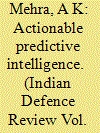

|
|
|
| 2 |
ID:
183023
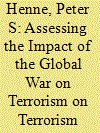

|
|
|
|
|
| Summary/Abstract |
After the 9/11 terrorist attacks, the United States called on Muslims to join it in its struggle against the attacks’ perpetrator, Al Qaeda (AQ). U.S. officials argued that Muslim states’ participation in these efforts could help the United States defeat AQ, but it could also benefit the states themselves by undermining the threat they faced from terrorism. As we are now over ten years out from the beginning of this global war on terrorism, it is possible to both ask and answer the question posed by U.S. demands: did it work? That is, did majority-Muslim states who implemented counterterrorism policies in line with America’s counterterrorism priorities benefit from this, through a reduction in the threat of terrorism? In this article, I argue that Muslim states that adopted policies in line with US priorities would accomplish their primary goal: disrupting Al Qaeda’s ability to carry out attacks. I use a quantitative analysis to demonstrate that states implementing the counterterrorism policies preferred by the United States experienced significantly fewer deaths from terrorist attacks than those that did not. These findings can contribute to debates over the global war on terrorism, as well as broad debates on effective counterterrorism and counterinsurgency tactics.
|
|
|
|
|
|
|
|
|
|
|
|
|
|
|
|
| 3 |
ID:
151983
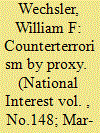

|
|
|
|
|
| Summary/Abstract |
ONE OF the few things that Presidents George W. Bush and Barack Obama have in common is that they reversed their long-standing approaches to counterterrorism during their very last years in office. They initially held diametrically opposed military policies, with Bush choosing invasion and occupation and Obama preferring disengagement and drone strikes. But by the end of their second terms they had both ended up in roughly the same place, with a central focus on indirect action—enabling local forces to achieve U.S. counterterrorism objectives.
|
|
|
|
|
|
|
|
|
|
|
|
|
|
|
|
| 4 |
ID:
099789
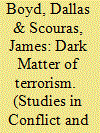

|
|
|
|
|
| Publication |
2010.
|
| Summary/Abstract |
The consequences of states' reactions to terrorist attacks can far outweigh the effects of the attacks themselves. Yet risk analysis, widely accepted as the proper analytical basis for assessing terrorist threats, largely ignores the consequences from potential reactions to attacks. It also generally fails to consider how the anticipation of these reactions may influence terrorists' attack preferences. Policymakers should therefore be wary of the limitations of risk analysis as currently practiced. Further, states should strive to avoid reactions to attacks that unwittingly further their adversaries' agendas, a goal that may be aided by strengthening public resilience to terrorism.
|
|
|
|
|
|
|
|
|
|
|
|
|
|
|
|
| 5 |
ID:
146268
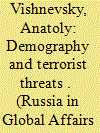

|
|
|
|
|
| Summary/Abstract |
Someone may find the idea strange of a link between demography and terrorism. Is this plausible or is it far-fetched? The meaning of my reflections is that the demographic component of what we now call international terrorism (although I am not sure that this is an accurate definition of what is happening today) is very important, yet I certainly do not mean to assert that only demographic events and processes fuel terrorism. Nevertheless, understanding the essence of global demographic processes has made it possible to foresee the present growth of terrorist threats long before they became a stark reality of our world today.
|
|
|
|
|
|
|
|
|
|
|
|
|
|
|
|
| 6 |
ID:
075751
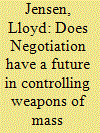

|
|
|
|
|
| Publication |
2006.
|
| Summary/Abstract |
Despite the heightened level of concern about weapons of mass destruction since 9/11, negotiations for strengthening the WMD nonproliferation regime have been somewhat less than productive. The fact that the material and technology for producing such weapons is also used for peaceful purposes helps explain the limited progress. Lack of trust, concern about equality and fairness as well as the tendency to use negotiations for ulterior purposes also make progress difficult. After considering these points, the article discusses some of the incentives and disincentives that have been used to influence positions on the nonproliferation issue and how paying attention to the needs and interests of the would-be proliferators might increase the chances of reaching mutually beneficial agreements.
|
|
|
|
|
|
|
|
|
|
|
|
|
|
|
|
| 7 |
ID:
096751
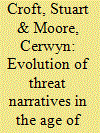

|
|
|
|
|
| Publication |
2010.
|
| Summary/Abstract |
This article examines the evolution of threat narratives in the age of terror, focusing on the United Kingdom. The analysis is broken down into two sections. The first part of the article presents four distinct and yet overlapping notions of the threats which have influenced both the West, and more specifically the UK, in debates about counterterrorism since 9/11. The four threat narratives-Al-Qaeda as a central organization; decentralized terror networks; home grown; and finally apocalyptic threats-have all been used to inform counter terror measures in the West. The second section of the article argues that terrorism has evolved strategically, and is hybridized owing to the security environment-interpenetrated by globalization, digital media and information communication technologies-in which it occurs. The article concludes with a preliminary discussion of some strategic and operational themes which have influenced the form and character of terrorism and insurgency, exploring how they impact on the ways in which threats are constituted and countered, illustrating that what is new maybe the nature of our own fears.
|
|
|
|
|
|
|
|
|
|
|
|
|
|
|
|
| 8 |
ID:
171562
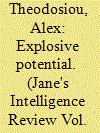

|
|
|
| 9 |
ID:
110650


|
|
|
|
|
| Publication |
2011.
|
| Summary/Abstract |
Scholars have used cultural theory (CT) to explain risk perceptions and opinion formation across an impressive array of public issues, ranging from environmental, regulatory, and energy policy to public health and economics. Although disparate, all these issues concern domestic policies. This article breaks with this trend by exploring the extent to which CT can help scholars better understand public beliefs about national security. Of critical importance in debates about national security are perceptions of individual versus collective threat and the appropriate role of authoritative institutions in protecting society from these threats. Because CT provides a framework that explicitly addresses these dimensions, national security issues provide an illuminating canvas for evaluating the theory's explanatory utility.
|
|
|
|
|
|
|
|
|
|
|
|
|
|
|
|
| 10 |
ID:
187796
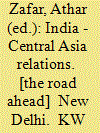

|
|
|
|
|
| Publication |
New Delhi, KW Publishers Pvt Ltd, 2021.
|
| Description |
xiii, 184p.hbk
|
| Series |
Sapru House Soundings on Area Studies
|
| Standard Number |
9789383445493
|
|
|
|
|
|
|
|
|
|
|
|
Copies: C:1/I:0,R:0,Q:0
Circulation
| Accession# | Call# | Current Location | Status | Policy | Location |
| 060262 | 327.54058/ZAF 060262 | Main | On Shelf | General | |
|
|
|
|
| 11 |
ID:
138801
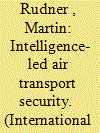

|
|
|
|
|
| Summary/Abstract |
International terrorism has a history of targeting airliners and airports. The deadliest-ever single act of terror against civil aviation was the 1985 bombing by Sikh terrorists of Air India flight 182 from Toronto over the Irish coast, with a loss of 329 passengers and 22 crew members. Since the 1990s, civil aviation has emerged as a principal target for various militant Islamist groups. Certain foreign governments, among them the Islamic Republic of Iran, are known to deploy client terrorist groups, like Hizbullah, for terrorist operations against countries toward which they are hostile. State-sponsored terrorism was responsible for the 1988 bombing of Pan Am flight 103 over Lockerbie, Scotland, with the loss of 259 lives, for which a Libyan intelligence officer was subsequently convicted but subsequently released before completing his jail term.
|
|
|
|
|
|
|
|
|
|
|
|
|
|
|
|
| 12 |
ID:
184007
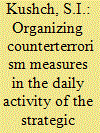

|
|
|
|
|
| Summary/Abstract |
The author presents approaches to and trends in the organizational activity of Strategic Missile Forces commanders in countering terrorism in assigned responsibility zones and in developing a counteraction control system.
|
|
|
|
|
|
|
|
|
|
|
|
|
|
|
|
| 13 |
ID:
082925
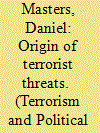

|
|
|
|
|
| Publication |
2008.
|
| Summary/Abstract |
Recent studies indicate that the number of terrorist incidents is declining while their lethality is increasing. This trend in casualty rates has raised the rhetoric on terrorism, leading to claims that a new form of terrorism has emerged over the last thirty years. The "new terrorism" is defined by a tendency towards maximum destruction and a pronounced religious motivation. The question is whether or not the new terrorism is actually driving current trends in terrorist violence? This study examines casualty rates by terrorist groups categorized by their ideologies and finds that trends in terrorist violence are not being driven by the new terrorism per se. Instead, all forms of terrorism are more violent generally, and variations of ethno-national terrorism are the most violent specifically.
|
|
|
|
|
|
|
|
|
|
|
|
|
|
|
|
| 14 |
ID:
074769
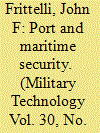

|
|
|
| 15 |
ID:
123180
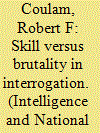

|
|
|
|
|
| Publication |
2013.
|
| Summary/Abstract |
This article reviews the central tenets of selection, training, doctrine, and organization in Israeli interrogation to suggest how the United States might learn from the Israeli experience. There is relatively little in the open literature on these particular issues of training and approach in Israel. The contrast between Israeli and US approaches raises questions about the effectiveness of US interrogation and suggests how the US might better use skill and cunning toward an effective, legal, and ethical American policy on interrogation. By themselves, professionalism and skill do not prevent torture, but they can provide an effective alternative to it. A change in American policy is essential, to counter pressures in Congress and elsewhere to sanction the use of torture in response to new terrorist threats.
|
|
|
|
|
|
|
|
|
|
|
|
|
|
|
|
| 16 |
ID:
069853


|
|
|
| 17 |
ID:
134102
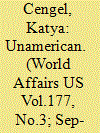

|
|
|
|
|
| Publication |
2014.
|
| Summary/Abstract |
They are not the most sympathetic characters. Veasna Sany goes by her former gang name "China." She has been convicted of possession and sale of cocaine, battery, and prostitution. Gnan "Mikki" Kroeung's convictions include terrorist threats and possession of a firearm. "Pich," a former methamphetamine addict, was caught engaging in credit card fraud. They all served time in US prisons and would now be home with their families in Philadelphia and Long Beach-if they were American citizens. But they aren't. They are legal permanent residents of the United States who have been deported to Cambodia, a country their parents fled before they were born.
|
|
|
|
|
|
|
|
|
|
|
|
|
|
|
|
| 18 |
ID:
125296
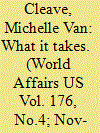

|
|
|
|
|
| Publication |
2013.
|
| Summary/Abstract |
"Freedom must be won anew by every generation." I was reminded of the truth behind these words of my old boss, Jack Kemp, in considering the current debate over Edward Snowden and the collection programs of the National Security Agency.
|
|
|
|
|
|
|
|
|
|
|
|
|
|
|
|
|
|
|
|
|